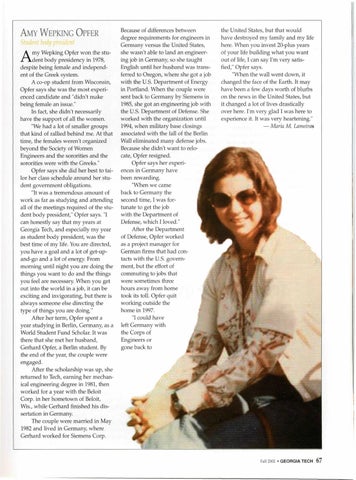AMY WEPKING OPFER
A
my Wepking Opfer won the student body presidency in 1978, despite being female and independent of the Greek system. A co-op student from Wisconsin, Opfer says she was the most experienced candidate and "didn't make being female an issue." In fact, she didn't necessarily have the support of all the women. "We had a lot of smaller groups that kind of rallied behind me. At that time, the females weren't organized beyond the Society of Women Engineers and the sororities and the sororities were with the Greeks." Opfer says she did her best to tailor her class schedule around her student government obligations. "It was a tremendous amount of work as far as studying and attending all of the meetings required of the student body president," Opfer says. "I can honestly say that my years at Georgia Tech, and especially my year as student body president, was the best time of my life. You are directed, you have a goal and a lot of get-upand-go and a lot of energy. From morning until night you are doing the things you want to do and the things you feel are necessary. When you get out into the world in a job, it can be exciting and invigorating, but there is always someone else directing the type of things you are doing." After her term, Opfer spent a year studying in Berlin, Germany, as a World Student Fund Scholar. It was there that she met her husband, Gerhard Opfer, a Berlin student. By the end of the year, the couple were engaged. After the scholarship was up, she returned to Tech, earning her mechanical engineering degree in 1981, then worked for a year with the Beloit Corp. in her hometown of Beloit, Wis., while Gerhard finished his dissertation in Germany. The couple were married in May 1982 and lived in Germany, where Gerhard worked for Siemens Corp.
Because of differences between degree requirements for engineers in Germany versus the United States, she wasn't able to land an engineering job in Germany, so she taught English until her husband was transferred to Oregon, where she got a job with the U.S. Department of Energy in Portland. When the couple were sent back to Germany by Siemens in 1985, she got an engineering job with the U.S. Department of Defense. She worked with the organization until 1994, when military base closings associated with the fall of the Berlin Wall eliminated many defense jobs. Because she didn't want to relocate, Opfer resigned. Opfer says her experiences in Germany have been rewarding. "When we came back to Germany the second time, I was fortunate to get the job with the Department of Defense, which I loved." After the Department of Defense, Opfer worked as a project manager for German firms that had contacts with the U.S. government, but the effort of commuting to jobs that were sometimes three hours away from home took its toll. Opfer quit working outside the home in 1997. "I could have left Germany with the Corps of Engineers or gone back to
the United States, but that would have destroyed my family and my life here. When you invest 20-plus years of your life building what you want out of life, I can say I'm very satisfied," Opfer says. "When the wall went down, it changed the face of the Earth. It may have been a few days worth of blurbs on the news in the United States, but it changed a lot of lives drastically over here. I'm very glad I was here to experience it. It was very heartening." — Maria M. Lameiras
Fall 2002 • GEORGIA TECH 6 7
